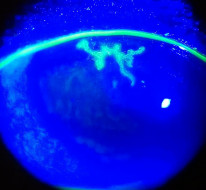There are 2 important forms of Herpes keratitis: Simplex and Zoster.
Herpes Simplex Keratitis
Herpes simplex keratitis is the most common infectious cause of corneal blindness in developed countries. It is further classified according to the layer of the cornea that is affected: epithelial or endothelial.
Pathology

- Primary herpes simplex infection causes blepharoconjunctivitis and the virus remains dormant within the trigeminal nerve ganglion.
- Subsequent reactivation of the virus leads to recurrent epithelial keratitis (secondary herpes simplex infection).
- Herpes simplex endothelial (also known as disciform) keratitis is an autoimmune hypersensitivity reaction to the herpes simplex antigen and manifests differently to epithelial keratitis.
Investigations
- Simplex keratitis is a clinical diagnosis but swabs can be taken for PCR/Giemsa stain.
- Giemsa stain would show multinucleated giant cells.
Epithelial vs Endothelial (Disciform)
Herpes Epithelial Keratitis |
Herpes Endothelial Keratitis |
|
|---|---|---|
Presentation |
|
|
Examination findings |
|
|
Management |
Topical acyclovir Steroids contraindicated as they interfere with corneal healing |
Oral acyclovir 400mg, 5 times per day Steroids can be used to curb inflammation, as long as there are no corneal ulcers that need healing |
Wessely ring is not specific to HSV keratitis, it is the circular deposition of an antibody-antigen complex, visible in the cornea.
Herpes Zoster Ophthalmicus
Herpes zoster ophthalmicus is essentially shingles of the eye. It can be severe and needs prompt treatment.
Pathology
- Primary infection of Varicella-zoster leads to chickenpox.
- Secondary reactivation of the latent virus leads to shingles (herpes zoster).
- Shingles of the eye (V1 dermatome) is herpes zoster ophthalmicus.
Presentation
- Dermatomal vesicular rash and neuropathic pain.
- Hutchinson sign: Rash on tip of nose indicates a high probability of ocular involvement because the tip of the nose is supplied by the nasociliary branch of Cranial Nerve V.
- Conjunctivitis and epithelial keratitis with non-ulcerative pseudodendrites that do not stain with fluorescein.
Management
- Acyclovir Oral 800mg 5 times per day

